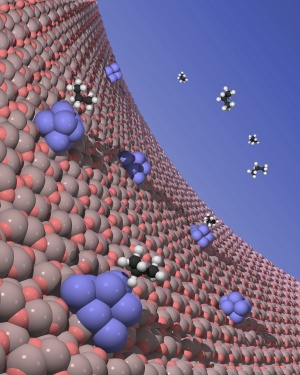Mar 13 2009
The process to turn propane into industrially necessary propylene has been expensive and environmentally unfriendly. That was until scientists at U.S. Department of Energy's Argonne National Laboratory devised a greener way to take this important step in chemical catalysis.
 Clusters of 8-10 platinum atoms deposited in pores of an aluminum oxide membrane are highly active and selective catalysts for the oxidative dehydrogenation of propane.
Clusters of 8-10 platinum atoms deposited in pores of an aluminum oxide membrane are highly active and selective catalysts for the oxidative dehydrogenation of propane.
"Using platinum clusters, we have devised a way to catalyze propane not only in a more environmentally friendly way, but also using far less energy than previous methods," Argonne scientist Stefan Vajda said.
Alkanes are typical feedstocks for transformation to alkenes, aromatics and chemicals containing value added moieties. Dehydrogenation is a route to such transformations, but it is an endothermic process requiring significant energy input.
Oxidative dehydrogenation (ODH) of propane to propylene is a multibillion dollar industrial process. ODH of alkanes is exothermic, and thus an attractive alternative to dehydrogenation. However, current ODH catalysts have limited activity and/or poor selectivity resulting from inability to prevent complete oxidation. Two classes of catalysts are used: vanadia and platinum. The vanadia based catalysts are highly selective, but their activity is relatively low. Pt-based catalysts are more active, but their selectivity is low.
Argonne scientists showed that the size preselected Pt8-10 clusters stabilized on high-surface-area supports are 40? times more active for the oxidative dehydrogenation of propane than previously studied platinum and vanadia catalysts, while at the same time maintaining high selectivity towards formation of propylene over by-products.
This new class of catalysts may lead to energy-efficient and environmentally friendly synthesis strategies and the possible replacement of petrochemical feedstocks by abundant small alkanes.
"The oxidative dehydrogenation of alkanes is a reaction that is exothermic and thus an attractive alternative to the endothermic process of dehydrogenation of alkanes," Argonne scientist Larry Curtiss said. "The endothermic process requires a significant energy input with an increased chance of environmentally unfriendly by-products."
Using high performance computing facilities at Argonne and elsewhere, Vajda and his colleagues proved theoretically that attractive interaction between the under-coordinated platinum and propane was the cause for the higher selectivity towards propylene and its high activity.